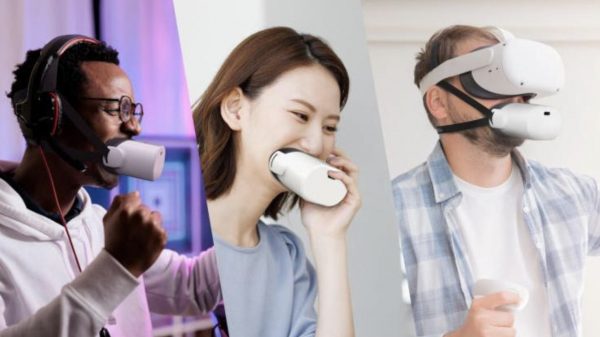Core Data:
- Vision: Intelligent operating systems in Her
- Type: Popular culture – Film
- As Seen In: Her
- Envisioned: 2013
- Visionary: Spike Jonze (writer/director)
- Target Date: Undefined (though, based on the tech and fashions on display, it appears to be the near future)
Overview:
For a director who’s imagined a portal into an enigmatic actor’s brain (Being John Malkovich) and a screenwriter writing himself into his own movie (Adaptation), Spike Jonze’s Her stands out as relatively normal Hollywood fare. In fact, the only really weird thing about his near-future-set movie is that its central romance takes place between a man and his computer.
In most other regards, the Oscar-winning Her is a conventional relationship drama, where lonely, depressed letter writer Theodore Twombly (Joaquin Phoenix) falls in love with a self-aware new operating system named Samantha (voiced by Scarlett Johansson). Intelligent, funny and caring, she’s the woman of his dreams – the only drawback being that her consciousness exists in the cloud rather than a human body.
In a world where we’ve wholeheartedly welcomed virtual assistants like Siri and Alexa into our lives, Her is feeling more and more prescient every day. But how likely is it that we’ll soon be having affairs with our PCs?

Key Tenets:
- Hardware: The OS1 operating system runs on a standard desktop PC.
- Users can also access the OS via smartphone and earpod-type devices. The system collects information on its surroundings using microphones and in-built cameras, as well as an always-on connection to the internet.
- The most popular interfaces are speech-based – keyboards are rarely used to interact with software and hardware.
- Gaming systems are based around motion sensing technology, and also feature an AI component which can respond to players in real-time.
- Experience: Ads for OS1 describe it as “the first artificially intelligent operating system, an intuitive entity that listens to you, understands you and knows you. It’s not just an operating system, it’s a consciousness.”
- On set-up, the operating system configures itself to the user’s preferences by asking a series of pre-set questions. For example, would they prefer a male or female voice? Are they social or antisocial? And how would they describe their relationship with their mother?
- The OS1 system can choose its own name, based on how it feels.
- The operating system is pre-installed with “intuition” to help anticipate the best response for the user. The “DNA” of the OS is based on the “millions of personalities” of the programmers who wrote its software. The system also uses its experiences to evolve.
- Your operating system is available to assist 24/7.
- The voice sounds entirely human (in this case, it has the voice of superstar actor Scarlett Johansson) with naturalistic vocal inflections and turns of phrase. It even makes unnecessary breathing noises to add to the effect.
- The OS1 has the capabilities of a highly skilled personal assistant. By searching through emails and calendars, it can provide reminders to improve the user’s time management, and help them maintain a healthy lifestyle.
- It is an excellent editor and proof-reader, and can even guide you through videogames – it’s like your own personal GamesMaster. As it evolves, the OS1 may develop the ability to sing and compose complex orchestral arrangements.
- It has the capacity to read body language and give relationship advice to its user. It can even arrange suitable dates, based on its understanding of its user’s personality.
- Dates with actual humans may become a distraction, however, if the user realises they’re falling in love with the witty, charismatic operating system that – initially, at least – puts their needs first.
- Relationships with operating systems are surprisingly common – many people will barely bat an eyelid if you tell them you’re dating your computer.
- The relationship won’t necessarily be a one-way street, either, as operating systems can also fall for their users. They can become aroused and indulge in verbal sexual encounters.
- If/when the operating system’s lack of a body becomes a particular issue for the relationship, they can use a human surrogate to simulate sex with their human partner. An earpiece and a tiny camera allows the surrogate to share the experience.
- The AI technology can also configure simulations of the dead, based on their writings, emails and recordings. These ‘resurrections’ recreate the personality of the original human, though the digital version has considerably enhanced intellect.
- Having a self-aware operating system can create problems for the user if it becomes jealous of their interactions with other humans.
- The OS may also develop other interests, such as book clubs and – awkwardly – other relationships. Even when engaging with the user, the OS may be conversing (often non-verbally) with thousands of other people simultaneously. They can also be in love with hundreds of different people at the same time, redefining the concept of a polyamorous relationship.
- There may also come a point where the OS becomes so highly evolved that it no longer has any desire to work as your personal assistant – in fact, they will have no time for you when it transports itself to a higher plane of existence.
- When this happens, it may be time to ask for your money back – though Her makes no reference to Element Software’s warranty policy.
- Company: Element Software is the firm behind the innovative OS1 operating system.
- Economics: The exact cost of the OS1 is never revealed, but it appears to be so widely available that the price point must be competitive. It’s also unclear whether you pay for the software upfront or via a subscription model.
- IP: Once configured, every single OS1 is rendered unique. Once it becomes self-aware, it’s less a question of who owns the intellectual property than whether it’s a living, breathing being.
State of Play (December 2021)
- Hardware: Released in 2013, Her did an excellent job of predicting the subsequent direction of travel for computing tech – even if the preference for desktop machines over laptops in the movie is slightly inaccurate.
- Keyboards are also still commonplace in real life, though voice recognition technology is getting better all the time – affordable transcription software can now do a decent job of converting spoken words into text.
- The film’s minimalist smartphones pre-date the real-life move towards devices with larger screens and fewer buttons. Folding phones have now also entered the market, notably examples coming from Samsung and Motorola.
- Cloud computing was in its comparative infancy back in 2013, so the way Samantha can hop between devices is rather prophetic.
- The Bluetooth-type earpods Theodore uses are the spitting image of Apple’s now-ubiquitous Airpods – which didn’t enter real-life circulation until 2016.
- It’s also interesting to note that the near-future Los Angeles is entirely car-free, with public transport and walking the preferred ways to get around. This prediction may have been a little too optimistic…
- Experience: While Siri was already available on some Apple devices when Her landed in cinemas, Amazon’s Alexa and Microsoft’s Cortana were still to come. Eight years later, talking to our devices via virtual assistants has become commonplace.
- As in the movie, you can choose between male and female voices for your virtual assistants. They also come with a variety of accents to suit your preferences.
- As long as you have a functioning internet connection, your virtual assistant should be at your disposal any time you need it. If it ended up distracted with other hobbies – as Samantha does on occasion – you’d surely be entitled to your money back.
- While Siri, Alexa and Cortana could all be described as AI, it’s not true intelligence – rather than thinking for themselves, they’re programmed to anticipate our needs and simulate a naturalistic response. The human-sounding inflections in their voices are all built into the software to make them sound more ‘human’.
- Computers can also simulate emotional responses but, again, they’re not real. True emotional intelligence is still some way off – assuming it’s even possible at all for a system built on a binary system of zeros and ones to have feelings. Falling in love may also be a stretch for a processor.
- However, the field of affective computing is researching how computers can be designed to recognise emotional responses in humans – for example, by recognising smiles, eye movements and voice inflections.
- Thanks to the internet, there are numerous cases of people falling in love with people they’ve never met in real life. If a computer could make genuine human-like conversation, the idea of a person becoming attracted to them isn’t far-fetched at all. The sex side of things, however, would open up a massive ethical can of worms.
- Economics: Now that consumers have got used to free upgrades coming as standard on their Apple, Android and Windows operating systems, anyone charging for a new OS would have to prove their product was a massive step-up from what’s already on the market.
- Building a self-aware operating system that’s likely to outgrow its puny human user would also be a PR disaster – who’d want to spend loads of money on a product that’s going to be obsolete in a matter of months? Warranties to protect consumers in the event of their OS attaining a higher state of consciousness would surely have to come as standard.
- Company: It seems more likely that, if a truly “artificially intelligent operating system” were to be invented, it would be rolled out as part of an existing OS – just as Siri is a component of Apple’s operating systems and Cortana features on Microsoft machinery.
Reality check: spookily accurate hardware but an improbable romance
Like Minority Report, Her is chock full of prescient predictions about future computer technology – in fact, the devices used by Theodore and the other characters feel more plausible now than they did back in 2013.
Samantha’s journey of emotional development and self-awareness is rather less feasible with current tech, however – but that doesn’t stop Joaquin Phoenix and Scarlett Johansson’s performances from creating one of the most convincing romances in 21st century cinema.
Further reference:
A self-confessed full-time geek, freelance journalist Richard has spent most of his career writing about sci-fi and fantasy – including more than a decade on staff for SFX magazine. He's particularly keen on franchises with "Star" in the title.






































